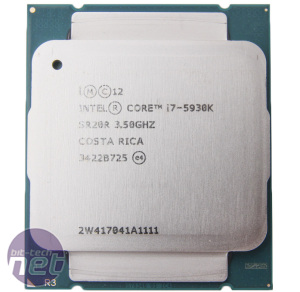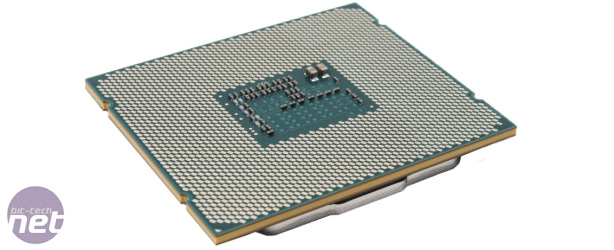
Intel Core i7-5930K and Core i7-5820K Review
You have three options when it comes to Intel's new Haswell-E CPUs. The top-end, £800 Core i7-5960X offers two additional cores, (eight in total with 16 threads), compared to the cheaper two of bunch.Whether you'll be running it at stock or overclocked, if you're heavily into rendering or some other multi-threaded tasks that can regularly make good use of 16 threads, it's likely you'll be saving yourself a lot of time by opting for this premium CPU.
For the rest of us that either can't stretch to that lofty price tag or just don't need 16 threads, the choice is down to two CPUs; the Core i7-5930K and the Core i7-5820K. They actually differ little except for one feature - PCI-Express lane count.
The former CPU offers the full complement of 40 lanes, like the Core i7-5960X, which leads to a more potent multi-GPU setup, particularly with three or more graphics cards. The Core i7-5820K on the other hand is significantly cheaper but only offers 28 lanes, meaning the best possible scenario is going to be a x16/x8 configuration.
So, as we mentioned in our review of the Core i7-5960X, your choice is a strategic one. However, as we haven't reviewed either of the cheaper models, we couldn't unequivocally recommend anything. So today, if you're looking to invest in a shiny new LGA2011-v3 system, after reading this article you should have a better idea.
Haswell-E and Devil's Canyon CPUs
| Intel CPU | Base Clock | Turbo Freq | Cores/Threads | Cache | PCI-E 3.0 Lanes | TDP | Price |
| Core i7-5960X | 3GHz | 3.5GHz | 8/16 | 20MB | 40 | 140W | £760 / $999 |
| Core i7-5930K | 3.5GHz | 3.7GHz | 6/12 | 15MB | 40 | 140W | £430 / $583 |
| Core i7-5820K | 3.3GHz | 3.6GHz | 6/12 | 15MB | 28 | 140W | £300 / $389 |
| Core i7-4790K | 4GHz | 4.4GHz | 4/8 | 8MB | 16 | 88W | £245 / $339 |
| Core i5-4690K | 3.5GHz | 3.9GHz | 4/4 | 6MB | 16 | 88W | £170 / $242 |
As you can see above, both CPUs have the same amount of shared Level 3 cache at 15MB - the Core i7-5960X does have a bit more, but they have the same TDP of 140W and a 22nm manufacturing process with the main differences apart from the PCI-Express lanes being a slight advantage in base and turbo frequencies - the Core i7-5930K has a slight advantage here, although just 100MHz once Turbo Mode kicks in.
Click to enlarge
The fact that the base clock on both these CPUs is so much higher than the Core i7-5960X - 500MHz higher in fact for the Core i7-5930K, means that in lightly-threaded applications and IPC, they're likely going to be a bit faster than their more expensive sibling. Pricing when we were writing this is pretty much spot-on with the table above's RRPs, although some etailers have a slight discount for the Core i7-5820K, which can be had for less than £290 - around £50 more expensive than the Core i7-4970K.
Extended Specifications: Core i7-5930K and Core i7-5820K
- Core Haswell
- Manufacturing process 22nm
- Cache L1: 12 x 32KB instruction/ data caches), L2 6 x 256KB, L3 15MB (shared)
- Memory controller Quad-channel DDR4, up to 2,133MHz
- Packaging LGA2011-v3
- GPU None
- Features, MMX, SSE, SSE2, SSE3, SSSE3, SSE4, SSE4.2, AES, AVX, M64T, F16C, Quick Sync Video, Hyper-Threading, Turbo Boost 2.0, VT-x

MSI MPG Velox 100R Chassis Review
October 14 2021 | 15:04










Want to comment? Please log in.